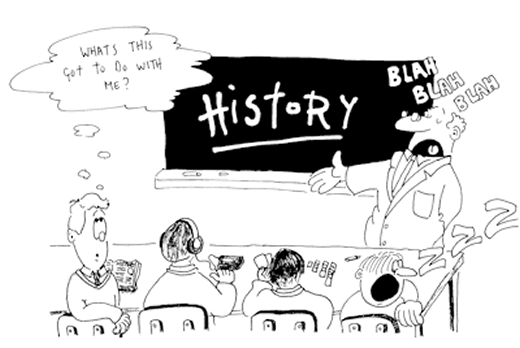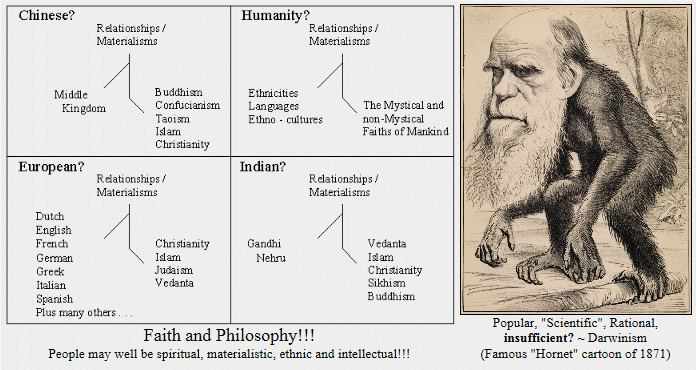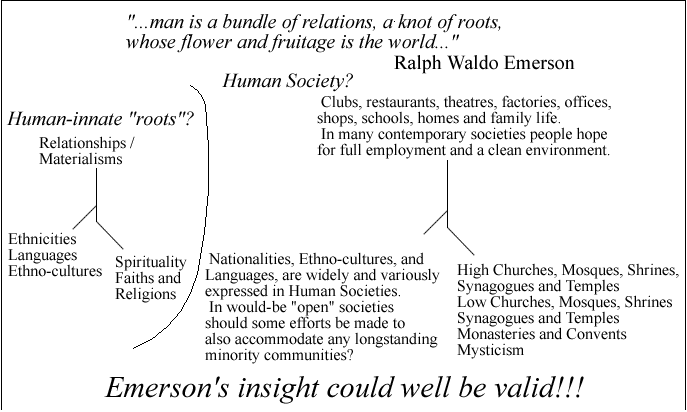Those who fail to learn the lessons of history are doomed to repeat it

"The biggest challenge facing the great teachers and communicators of history is not to teach history itself, nor even the lessons of history, but why history matters. How to ignite the first spark of the will o'the wisp, the Jack o'lantern, the ignis fatuus [foolish fire] beloved of poets, which lights up one source of history and then another, zigzagging across the marsh, connecting and linking and writing bright words across the dark face of the present. There's no phrase I can come up that will encapsulate in a winning sound-bite why history matters. We know that history matters, we know that it is thrilling, absorbing, fascinating, delightful and infuriating, that it is life."
Stephen Fry, Making History

"…can we possibly refuse to admit that there exist in each
of us the same generic parts and characteristics as are found in
the state? For I presume the state has not received them from any
other source. It would be ridiculous to imagine that the presence
of the spirited element in cities is not to be traced to
individuals, wherever this character is imputed to the people, as
it is to the natives of Thrace, and Scythia, and generally
speaking, of the northern countries; or the love of knowledge,
which would be chiefly attributed to our own country; or the love
of riches, which people would especially connect with the
Phoenicians and the Egyptians."
Socrates / Plato ~ who lived long, long ago ~ in Ancient Greece
Socrates / Plato ~ who lived long, long ago ~ in Ancient Greece

It is remarkable that most men read little History. Even scholars, whose business it is to read, complain of its dullness. This fact may suggest that it is not rightly written for
it should, should it not? Correspond to the whole of the mind, to whatever is lovely and powerful. No man can think that this all-containing picture if seen in good light could
be devoid of interest. …
Ralph Waldo Emerson
Ralph Waldo Emerson

"The value of history is, indeed, not scientific but moral: by liberalizing the mind, by deepening the sympathies, by fortifying the will, it enables us to control, not society, but ourselves -- a much more important thing; it prepares us to live more humanely in the present and to meet rather than to foretell the future."
Carl Becker, 1873-1945, U.S. historian
How possible is it to learn lessons of history?
 When it comes to ' the lessons of history ' there are doubtless many things we could aspire to learn. Some of those would be more practically useful, in terms of contributing to the normal and decent functioning of well-meaning societies, than others.
When it comes to ' the lessons of history ' there are doubtless many things we could aspire to learn. Some of those would be more practically useful, in terms of contributing to the normal and decent functioning of well-meaning societies, than others.
On the first part of this page some quotes are presented showing how some observers express disillusionment about Humanity's all-too-frequent failure to learn worthwhile lessons from history!
The last few quotations, on the other hand, show an appreciation that deeply important lessons about Human Existence can actually be learnt from the study of History.
Following on from these initially dismissive, and then aspirational, overviews of the possibility of learning lessons of history some important ideas about the Study of History that have been expressed by Ralph Waldo Emerson ~ aka the Sage of Concord ~ are considered.
"We spend a great deal of time studying history, which, let's face it, is mostly the history of stupidity."
Stephen Hawking

"That men do not learn very much from the lessons of history is the most important of all the lessons of history."
Aldous Huxley

"If men could learn from history, what lessons it might teach us! But passion and party blind our eyes, and the light which experience gives us is a lantern on the stern which shines only on the waves behind."
Samuel Taylor Coleridge

"Rulers, Statesmen, Nations, are wont to be emphatically commended to the teaching which experience offers in history. But what experience and history teach is this - that people and governments never have learned anything from history, or acted on principles deduced from it. Each period is involved in such peculiar circumstances, exhibits a condition of things so strictly idiosyncratic, that its conduct must be regulated by considerations connected with itself, and itself alone."
G. W. F. Hegel

"History repeats itself because no one was listening the first time."
Anonymous

"Those who fail to learn the lessons of history are doomed to repeat it."
George Santayana
N.B. This quote is sometimes paraphrased as:-
"If we do not learn from the mistakes of history, we are doomed to repeat them." (or similar)
In its original setting this "Those who fail to learn the lessons of history are doomed to repeat it quote" seems to have actually read:-
"Progress, far from consisting in change, depends on retentiveness. When change is absolute there remains no being to improve and no direction is set for possible improvement: and when experience is not retained, as among savages, infancy is perpetual. Those who cannot remember the past are condemned to repeat it."

"Those that fail to learn from history, are doomed to repeat it."
Winston Churchill

"The so-called lessons of history are for the most part the rationalizations of the victors. History is written by the survivors."
Max Lerner

Leaving disillusionment aside we can
now turn to some glimmers of hope that
learning lessons from History is possible
"Human nature will not change. In any future great national trial, compared with the men of this, we shall have as weak and as strong, as silly and as wise, as bad and as good. Let us therefore study the incidents in this as philosophy to learn wisdom from and none of them as wrongs to be avenged."
Abraham Lincoln (in the context of The American Civil War of 1861 to 1865)

"History is for human self-knowledge ... the only clue to what man can do is what man has done. The value of history, then, is that it teaches us what man has done and thus what man is."
R. G. Collingwood

"What man is, only history tells."
George Mosse

"Mankind are so much the same, in all times and places, that history informs us of nothing new or strange in this particular. Its chief use is only to discover the constant and universal principles of human nature."
David Hume
Such celebrated "Men of Letters" as Emerson and Shakespeare have accepted that Human Nature is 'Tripartite' and Emerson accepted that there was an investigable association between Human Nature and History.
Ralph Waldo Emerson
RALPH WALDO EMERSON (1803-1882) was, in his time, the leading voice of intellectual culture in the United States. He remains widely influential to this day through his essays, lectures, poems, and philosophical writings.
To quote Ralph Waldo Emerson, from his famous Essay ~ History :-
"In old Rome the public roads beginning at the Forum proceeded north, south, east, west, to the centre of every province of the empire, making each market-town of Persia, Spain, and Britain pervious to the soldiers of the capital: so out of the human heart go, as it were, highways to the heart of every object in nature, to reduce it under the dominion of man. A man is a bundle of relations, a knot of roots, whose flower and fruitage is the world. His faculties refer to natures out of him, and predict the world he is to inhabit, as the fins of the fish foreshow that water exists, or the wings of an eagle in the egg presuppose air. He cannot live without a world."
and again:-
"There is one mind common to all individual men....
....Of the works of this mind history is the record. Man is explicable by nothing less than all his history. All the facts of history pre-exist as laws. Each law in turn is made by circumstances predominant. The creation of a thousand forests is in one acorn, and Egypt, Greece, Rome, Gaul, Britain, America, lie folded already in the first man. Epoch after epoch, camp, kingdom, empire, republic, democracy, are merely the application of this manifold spirit to the manifold world."
....Of the works of this mind history is the record. Man is explicable by nothing less than all his history. All the facts of history pre-exist as laws. Each law in turn is made by circumstances predominant. The creation of a thousand forests is in one acorn, and Egypt, Greece, Rome, Gaul, Britain, America, lie folded already in the first man. Epoch after epoch, camp, kingdom, empire, republic, democracy, are merely the application of this manifold spirit to the manifold world."
In the later eighteen-twenties Ralph Waldo Emerson read, and was very significantly influenced by, a work by a French philosopher named Victor Cousin.
A key section of Cousin's work reads as follows:
"What is the business of history? What is the stuff of which it is made? Who is the personage of history? Man : evidently man and human nature.
There are many different elements in history. What are they? Evidently again, the elements of human nature. History is therefore the development of humanity,
and of humanity only; for nothing else but humanity develops itself, for nothing else than humanity is free. …
… Moreover, when we have all the elements, I mean all the essential elements, their mutual relations do, as it were, discover themselves. We draw from the nature of these different elements, if not all their possible relations, at least their general and fundamental relations."
Introduction to the History of Philosophy (1829)
… Moreover, when we have all the elements, I mean all the essential elements, their mutual relations do, as it were, discover themselves. We draw from the nature of these different elements, if not all their possible relations, at least their general and fundamental relations."
Introduction to the History of Philosophy (1829)
Even before he had first read Cousin, (in 1829), Emerson had expressed views in his private Journals which suggest that he accepted that Human Nature, and Human Beings, tend to display three identifiable aspects and orientations:
Imagine hope to be removed from the human breast & see how Society will sink, how the strong bands of order & improvement will be relaxed & what a deathlike stillness would take the place of the restless energies that now move the world. The scholar will extinguish his midnight lamp, the merchant will furl his white sails & bid them seek the deep no more. The anxious patriot who stood out for his country to the last & devised in the last beleagured citadel, profound schemes for its deliverance and aggrandizement, will sheathe his sword and blot his fame. Remove hope, & the world becomes a blank and rottenness.
(Journal entry made between October and December, 1823)
In all districts of all lands, in all the classes of communities thousands of minds are intently occupied, the merchant in his compting house, the mechanist over his plans, the statesman at his map, his treaty, & his tariff, the scholar in the skilful history & eloquence of antiquity, each stung to the quick with the desire of exalting himself to a hasty & yet unfound height above the level of his peers. Each is absorbed in the prospect of good accruing to himself but each is no less contributing to the utmost of his ability to fix & adorn human civilization. (Journal entry of December, 1824)
Our neighbours are occupied with employments of infinite diversity. Some are intent on commercial speculations; some engage warmly in political contention; some are found all day long at their books … (This dates from January - February, 1828)
In all districts of all lands, in all the classes of communities thousands of minds are intently occupied, the merchant in his compting house, the mechanist over his plans, the statesman at his map, his treaty, & his tariff, the scholar in the skilful history & eloquence of antiquity, each stung to the quick with the desire of exalting himself to a hasty & yet unfound height above the level of his peers. Each is absorbed in the prospect of good accruing to himself but each is no less contributing to the utmost of his ability to fix & adorn human civilization. (Journal entry of December, 1824)
Our neighbours are occupied with employments of infinite diversity. Some are intent on commercial speculations; some engage warmly in political contention; some are found all day long at their books … (This dates from January - February, 1828)
The quotes from Emerson are reminiscent of a line from another "leading voice of intellectual culture" - William Shakespeare.
There's neither honesty, manhood, nor good fellowship in thee.
William Shakespeare: Henry IV (Pt 1), Act I, Scene II
William Shakespeare: Henry IV (Pt 1), Act I, Scene II
Plato, Socrates and Shakespeare endorse a 'Tripartite Soul' view of Human Nature. Platos' Republic

"The first glance at History convinces us that the actions of men proceed from their needs, their passions, their characters and talents; and impresses us with the belief that such needs, passions and interests are the sole spring of actions."
Georg Hegel, 1770-1831, German philosopher, The Philosophy of History (1837)
On another of our pages ~ Understanding the Past and the Present ~ suggestions are made that such "Tripartism" would support persons living out their lives long, long ago in tribes and in city-states.
Capacities of Honesty, Manhood and Good-fellowship would all be highly beneficial to persons living in such small-scale Human groupings as tribes and in city-states.
Individuals would tend to behave considerately towards their group-fellows, be capable of co-operation in defence of their group and be capable of entering into personal relationships and economic activity.
City-states can be held to have been more viable than hunter-gatherer tribes because there could have been greater food security through stored agricultural surpluses and more opportunity to enter into trade within and between city-states.
More recently Europe featured Monarchies and Empires - where some men worked, some men fought (Knights) and some men prayed (Priests). Such dynastic sovereignty being displaced in time by Constitutional Monarchies and Republics where democracy applies.

Ralph Waldo Emerson wrote that:-
"...man is a bundle of relations, a knot of roots,
whose flower and fruitage is the world..."
~ Should this be true it would follow that Human Societies often tend to arise out of the Human Condition as directly influenced by Human Nature!
"...man is a bundle of relations, a knot of roots,
whose flower and fruitage is the world..."
~ Should this be true it would follow that Human Societies often tend to arise out of the Human Condition as directly influenced by Human Nature!

N. B. The page mentioned in the graphic ~ roots.asp ~
has been replaced by this page
This 'knot of roots' insight features in:
According to the seriously influential philosopher Immanuel Kant, in his brief work entitled "Idea for a Universal History from a Cosmopolitan Point of View" :-
"Whatever concept one may hold, from a metaphysical point of view, concerning the freedom of the will, certainly its appearances,
which are human actions, like every other natural event, are determined by universal laws. However obscure their causes, history,
which is concerned with narrating these appearances, permits us to hope that if we attend to the play of freedom of the human will
in the large, we may be able to discern a regular movement in it, and that what seems complex and chaotic in the single individual
may be seen from the standpoint of the human race as a whole to be a steady and progressive though slow evolution of its original endowment."

